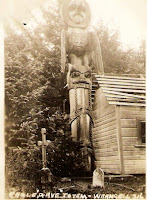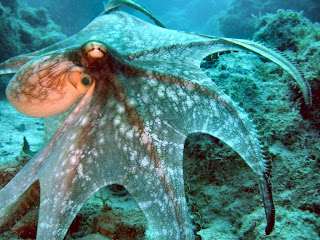In My Father's Cabin
The oil-barrel stove sears fire, spinning black soot into spider webbed patterns on the ceiling. Wool socks hang drying on bunk bed rails, river sand scatters across the floor. On cabin porch, I swat mosquitoes, and glimpse a dark silhouette awash in graying light; its yellow eyes lope into my thoughts.
It is here at the end of the world that clan brother chases sun and moon, fleeing with tracks and windblown sand. Inside the cabin, my sleeping bag is unable to warm the howls wounding the nightfall; its aching bay is answered deep in the timber behind the cabin.
Like the man beneath the transformation mask, the cry releases loosely hinged cedar, unfolds its split image panels and exhales on the burning lantern, bellowing the flickering shapes, shifting cabin wall to forest path. It invokes a story my grandparents told me about hunting in Thomas Bay—at dusk wolves ambled through the treeline and in waning daylight, stood—transformed—and walked like men.
 |
| Late 19th Century Wolf Transformation Mask, Kawakwaka'wak |
"In My Father's Cabin" Appeared in Mud Job, Oct. 12, 2011
*The Stikine River (pron.: /stɪˈkiːn/) is a river, historically also the Stickeen River, approximately 610 km
(379 mi) long, in northwestern British Columbia in Canada and southeastern Alaska in the United States.
Considered one of the last truly wild major rivers in B.C., it drains a rugged, largely pristine, area east of the Coastal Mountains, cutting a fast-flowing course through the mountains in
deep glacier-lined
gorges to empty into Eastern Passage, just north of the city of Wrangell, which is situated at the north end of Wrangell Island in the Alexander Archipelago. (Wikipedia)




Comments